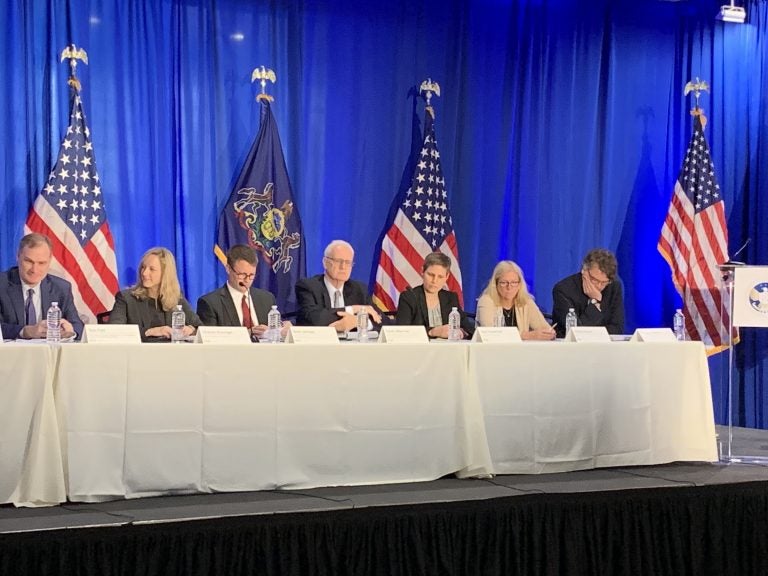Should feds let debt collectors call 7 times a week? Stakeholders clash in West Philly
Under a lengthy proposal the CFPB released Tuesday, debt collectors could also email and text borrowers as much as they want. Consumer advocates and creditors have concerns.

A panel discussion convened by the Consumer Financial Protection Bureau discussed the changes to the U.S. debt collection process at the University of Pennsylvania. Consumer advocates and creditors have concerns. (Aaron Moselle/WHYY)
The Consumer Financial Protection Bureau is proposing new rules to allow debt collectors to call consumers seven times a week — per account. Advocates in Philadelphia — the poorest of the country’s 10 biggest cities — say that’s far too much.
Under a lengthy proposal the CFPB released Tuesday, debt collectors could also email and text borrowers as much as they want.
To Michael Froehlich, managing attorney at Community Legal Services, that’s excessive, crossing the line from communication to harassment.
“If you don’t have the money, you don’t have the money,” said Froehlich on Wednesday during a two-hour panel discussion convened by the CFPB at the University of Pennsylvania. “The 10th is not going to change that, and the 20th call is not going to change that.”
Fellow panelist Patricia Hasson, president of Clarifi, a financial counseling nonprofit, said clients often reach out because they have seven or eight unsecured debts they need help managing. Under the proposed rule, the could mean consumers get dozens of calls each week.
“And then if you had any of the other debt in, student loan in particular, you’re now up to 70, 80, 90 calls a week. I don’t know about you, but I don’t answer my phone anymore when I can’t identify a number,” said Hasson.
Debt collectors said that’s an unlikely scenario, though they also argued the proposed call cap may hinder collecting the money clients are owed depending on the consumer and what kind of debt is being pursued.
Mark Neeb, CEO of ACA International, an association of credit and collection professionals, called the potential rule change “arbitrary.”
“We don’t believe that one size fits all,” Neeb, adding that the proposal could force more debt collectors to sue.
The bureau’s proposal would also notably allow debt collectors to email and text consumers about the money they owe unless that debtor tells them to stop contacting them that way by unsubscribing.
The CFPB argues the rule change is necessary to modernize debt collection. The Fair Debt Collection Practices Act, the federal law protecting people from “harassing, oppressing or abusing” behavior from debt collectors, hasn’t been updated since it was adopted in 1977.
“That’s the year the first Star Wars movie was released, Jimmy Carter became president, and a small company named Apple tried to introduce the world to the personal home computer,” said CFPB director Kathy Kraninger before the panel began.
Critics maintained it’s unfair to have a system where consumers can be contacted automatically, instead of choosing to opt-in to getting texts and emails about the money they owe.
Thirty percent of Pennsylvania residents — nearly four million residents — have some type of debt in collections, according to the National Consumer Law Center. The median debt amount is $1,452.
Debt collectors sued more than 16,000 Philadelphians in 2018.
Consumers have 90 days to comment on the protection bureau’s plan.
WHYY is your source for fact-based, in-depth journalism and information. As a nonprofit organization, we rely on financial support from readers like you. Please give today.





